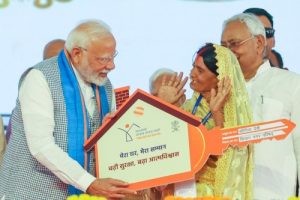In Bihar assembly polls, it looks that from the last three assembly elections, all party has shown faith on the candidates from the criminal background. Criminalisation of politics simply means to use politics or political power for nefarious gains. From the data by Association for Democratic Reforms (ADR) on Oct 20 and Oct 27, we may see that political parties have no interest in reforming the electoral system. Law maker are himself breaking the law, it is the reason the Indian democracy is suffering.
However, The directions of the Top Court have had no effect on the political parties in selection of candidates as they have again followed their old practice of giving tickets. For instance, Criminal charges registered against 31 per cent of candidates in the first phase of “Bihar assembly elections” (BAE) 2020. All big parties have distributed 31 to 70 per cent tickets to those who have criminal charges against themselves. As far as phase II is concerned, all major parties have distributed 47 per cent to 64 per cent tickets to the people having criminal cases against them.
A report by the Bihar Election Watch (BEW) and Association for Democratic Reforms (ADR) revealed that the Rashtriya Janata Dal (RJD) has fielded the maximum number of tainted candidates in the first and second phase of “Bihar assembly elections” (BAE) 2020. Further, ADR and BEW have analysed the self-sworn affidavits of 1,064 out of 1,066 candidates, who are contesting in the BAE Phase I, and all 1,463 candidates, who are contesting in the BAE Phase II.
Phase I Analysis of Criminal Background
No qualms in fielding candidates with a criminal background and it is reflected in the first phase of BAE 2020 as out of 1,064, 328 (31 per cent) candidates are with criminal cases and Rashtriya Janta Dal (RJD) tops the list while Bharatiya Janata Party (BJP) comes in the second position with (72 per cent). Out of these 328 candidates, 244 (23 per cent) are facing Serious criminal charges. In the context of finance, About 35 per cent or 375 candidates are crorepatis. The average asset of candidates in the first phase election is ₹1.99 crore, the ADR report asserted.

The report highlighted that, 30 (73 per cent) out of 41 candidates analysed from RJD, 21 (72 per cent) out of 29 candidates analysed from BJP, 24 (59 per cent) out of 41 candidates analysed from LJP, 12 (57 per cent) out of 21 candidates analysed from INC, 15 (43 per cent) out of 35 candidates analysed from JD(U) and 8 (31 per cent) out of 26 candidates analysed from BSP have declared criminal cases against themselves in their affidavits.
Moreover, 22 (54 per cent) out of 41 candidates analysed from RJD, 20 (49 per cent) out of 41 candidates analysed from LJP, 13 (45 per cent) out of 29 candidates analysed from BJP, 9 (43 per cent) out of 21 candidates analysed from INC, 10 (29 per cent) out of 35 candidates analysed from JD(U) and 5 (19 per cent) out of 26 candidates analysed from BSP have declared serious criminal cases against themselves in their affidavits.
On crime against women, As many as 29 candidates have declared cases related to crime against women and out of 29 candidates, 3 candidates have declared cases related to rape (IPC Section – 375 and 376), and 21 candidates have declared cases related to murder (IPC Section-302) against themselves. While 62 candidates have declared cases related to Attempt to murder (IPC Section-307) against themselves. Following the data, 61 (86 per cent) out of 71 constituencies are Red alert constituencies. Red alert constituencies are those where 3 or more contesting candidates have declared criminal cases against themselves, the data asserted.
Phase II Analysis of Criminal Background
Out of 1,463 candidates in the ‘second phase’, About 34 per cent or 502 candidates are facing criminal charges. Out of these 502 candidates, 389 (27 per cent) are facing serious criminal charges. Serious criminal cases are non-bailable offences with over five years of imprisonment. On financial also, About 34% or 495 candidates are Crorepati. The average asset of candidates in the second phase election is ₹1.72 crore, it said.

The report also noted, 36 (64 per cent) out of 56 candidates analysed from RJD, 29 (63 per cent) out of 46 candidates analysed from BJP, 14 (58 per cent) out of 24 candidates analysed from INC, 28 (54 per cent) out of 52 candidates analysed from LJP, 16 (49 per cent) out of 33 candidates analysed from BSP and 20 (47 per cent) out of 43 candidates analysed from JD(U) have declared criminal cases against themselves in their affidavits.
Among the major parties, 28 (50 per cent) out of 56 candidates analysed from RJD, 24 (46 per cent) out of 52 candidates analysed from LJP, 20 (44 per cent) out of 46 candidates analysed from BJP, 14 (42 per cent) out of 33 candidates analysed from BSP, 10 (42 per cent) out of 24 candidates analysed from INC and 15 (35 per cent) out of 43 candidates analysed from JD(U) have declared serious criminal cases against themselves in their affidavits.
As many as 49 candidates have declared cases related to crime against women and out of 49 candidates, 4 have declared cases related to rape (IPC Section – 376). While 32 candidates have declared cases related to murder (IPC Section-302) against themselves and 143 candidates have declared cases related to Attempt to murder (IPC Section-307) against themselves. Despite this, 84 (89 per cent) out of 94 constituencies are Red alert constituencies, it said.
Comparatively, It can be seen as the large scale of “criminalisation of politics” in Bihar Assembly election 2015 as well, an analysis by ADR, the state shows that 57 per cent of the serving MPs and MLAs and 30 per cent of the candidates for the election had declared criminal charges against themselves. Five or more candidates with criminal records contested on 43 per cent of the total Assembly seats (243). In 2015, out of 81 RJD MLAs, 46 MLAs (64 Per cent) had criminal charges against them, followed by BJP – 36 out of 53 MLAs have a criminal background and JDU – which had 34 tainted MLAs in 71 seats.
To check the entry of criminals in Indian politics, The Top court in its directions dated 13th February, 2020 had specifically instructed political parties to give reasons for such selection and why other individuals without criminal antecedents could not be selected as candidates. Election Commission of India also asked the political parties to provide reasons for their selection so that voters can make an informed choice. However, political observers are skeptical about the impact of these guidelines on the ground.
Causes
The cause of criminalisation is a bond between ‘politicians and bureaucracy’. Other reason of criminalisation are poverty, illiteracy, lack of political will, narrow self-interests, use of money and muscle power, Un-development, and prismatic nature of our social system etc. To curbing the same, The top court and EC have taken many initiative to cycle the criminalisation of politics.
Although, it is parliament’s responsibility to amend the Representation of the People (RPA) Act 1951, which deals with disqualification of candidates against whom charges have been proved in court for serious offences. In spite of taking appropriate measures to amend the RPA Act, there has been an unsaid understanding among the political parties which deters Parliament to make strong law curbing criminalisation of politics.
Recommendations of ADR
- To remedy the existing menace of criminalization is to immediately act upon the plausible solutions offered by many committees, civil society and citizens. The top court of India being the ultimate custodian of “Justice and Rule of Law” should reprimand political parties and politicians for their complete lack of will, reprehensible predilection and absence of required laws.
- Permanent disqualification of candidates convicted for heinous crimes like murder, rape, smuggling, dacoity, kidnapping etc.
- Disqualification of persons from contesting elections to the public offices against whom charges have been framed for having committed serious criminal offences punishable by imprisonment of at least 5 years, and the case is filed at least 6 months prior to the election in question.
- Cancellation of tax exemptions given to the political parties who field such tainted candidates.
- Bringing political parties under the Right to Information Act.
- De-register and de-recognise any political party if it knowingly puts up a candidate with a tainted background.
- Political party should annually file the information on criminal antecedents of their Office Bearers and make such records available to the public, including NIL records.
- Disqualification of candidates furnishing false information in the election affidavit (Form 26).
- Ensure trial of cases in which the politicians are accused to be concluded in a time bound manner.
- Implementation of SC judgment dated 23rd September, 2013 (i.e provision of NOTA buttons on the EVMs) in its letter and spirit by ensuring a) if NOTA gets more votes than any of the candidates, none of the candidates should be declared elected, and a fresh election should be held; b) in the fresh election, none of the candidates in the earlier election, in which NOTA got the highest number of votes, should be allowed to contest, the ADR recommended.
Given the reluctance by the political parties to cycle criminalisation of politics and its growing detrimental impacts on Indian democracy, Indian courts must now seriously consider banning people accused with serious criminal charges from contesting elections. While there are many narratives for and against such a move, it will be a step in the appropriate direction for making Indian elections more free and fair.
Way Forward
The legal framework needs to be reformed to effectively cycle the steady flow of criminals into the political process. The issues of the limited deterrence posed by disqualification upon conviction, and the delays in trials of influential persons that result in a subversion of the process of justice needs to be urgently addressed. The EC must take adequate measures to break the nexus between the criminals and the politicians.
The most significant step in this direction would be checking the use of ‘black money’ in party and election funding. Also, A strong political will is required on the part of government to decriminalize the entire political system by enactment of required legislations and taking adequate measures. Although, Politics can only be decriminalized by larger societal awareness and public participation in elections, politics and governance. Further, electoral process should be made more inclusive through wider participation from all sections of the society.
Consequently, Many committees like Dinesh Goswami and Inderjeet Committee on the “electoral reforms” have suggested for state funding on elections. It will curb use of the black money and will lead to the curbing of criminalization in politics. EC can register a political party but cannot deregister it. Regulating the affairs of a political party is significant for a cleaner electoral process. Therefore, it is imperative to strengthen the EC. It also requires a behavioural change, Until the citizens realise that people who bribe them for votes cannot be trusted and it will be to their ultimate disadvantage, the efforts to cycle criminalisation of politics will have limited impact.
The Bihar election held in three phases for a total of 243 seats – the first phase for 71 seats on October 28, the second phase for 94 seats on November 3 and the third phase for the remaining 78 will be on November 7. The results will be announced on November 10.
Author: Trilok Singh is with CEO here.

























Add Comment